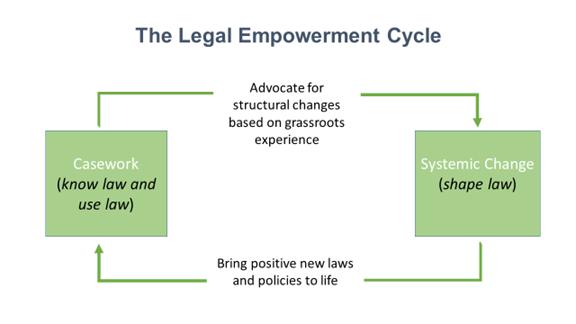"Nowhere have I encountered restrictions on the use of law by ordinary people that are as draconian or anti-democratic as the ones we have in the United States."
https://bit.ly/3iy2tPr
1/">https://bit.ly/3iy2tPr&q...
https://bit.ly/3iy2tPr
1/">https://bit.ly/3iy2tPr&q...
"Law is supposed to be the language we use to translate dreams about justice into living institutions that hold us together. Law is supposed to be the difference between a society ruled by the most powerful and one that honors the dignity of everyone, strong or weak."
2/
2/
"But that is not the country we live in. Our legal system is driving inequality rather than reducing it."
3/
3/
"Criminal justice is so broken that you might think it’s the main way in which our legal system is failing. But in reality, the harms of our legal system reach much further, into nearly every domain of our lives."
4/
4/
"We have laws on the books (and hopefully more coming) that offer at least partial protection against each of those threats to basic rights. But laws on the books are worth little if you can’t get them to work for you when you need them."
5/
5/
"& #39;It’s nearly impossible to find a lawyer who will represent you on a $500 unpaid wage case,& #39; said Ho. Five hundred dollars is a significant amount for a low-wage worker, but it’s less than a lawyer’s legal fees would be to provide help in the case.
6/
6/
And yet advice from a workers’ center is unauthorized practice of law. & #39;So what are workers supposed to do?& #39; asked Ho."
"Bar associations defend unauthorized practice of law rules as a way of protecting people from untrained quacks."
7/
"Bar associations defend unauthorized practice of law rules as a way of protecting people from untrained quacks."
7/
"In reality, the rules seem to be more about protecting the interests of lawyers. State courts, which are of course made up of lawyers, hold the power to set and enforce these rules, rather than state legislatures."
8/
8/
"In theory, the navigators are offering legal information, which is allowed, rather than legal advice, which is not allowed.
Talk to a friend about a problem they have, and pretty quickly you will move from information in the abstract
9/
Talk to a friend about a problem they have, and pretty quickly you will move from information in the abstract
9/
toward how that information applies to your friend’s situation in particular. At that point, a court navigator or anyone else who doesn’t fall under the few official exceptions is committing a crime."
10/
10/
"But perhaps the logic of Johnson v. Avery, the decision that barred Tennessee from banning jailhouse lawyering, should apply outside of prisons as well. When there are so many Americans with justice needs who cannot access legal support—even more now because of the pandemic—
11/
11/
is it conscionable to criminalize people who help each other?"
"Advancing justice requires not just expanding access to the rules we have now but changing those rules to make them more fair. That’s easier said than done."
12/
"Advancing justice requires not just expanding access to the rules we have now but changing those rules to make them more fair. That’s easier said than done."
12/
"Yet I have found that the practice of knowing and using law—imperfect as our laws are—can chip away at disaffection. The practice of knowing and using law to tackle a concrete problem can make the prospect of shaping law feel less abstract."
13/
13/
"When positive reforms are adopted, paralegals educate their communities about the new legal provisions and use them to solve concrete problems. This cycle represents the core vision of legal empowerment: that all people should be able to know law, use law, and shape law."
14/
14/
"When law is out of reach or cruelly unequal for so many of us, it can’t be a meaningful check on democracy’s potential for ugliness. Rather, people grow cynical, and ugliness—Trumpian or otherwise—thrives."
15/
15/
"To deepen democracy, we should invest in legal empowerment rather than criminalizing it. Currently, we spend a pittance on the problem of making law work for people."
16/
16/
"Furthermore, LSC-funded agencies are barred from pursuing systemic solutions to systemic problems.
Legal aid agencies are drowning in individual cases but forbidden from taking on the rules and systems that are causing the deluge."
17/
Legal aid agencies are drowning in individual cases but forbidden from taking on the rules and systems that are causing the deluge."
17/
"If we can ask today what it would take to offer health care to all, we should similarly grapple with what it would take to build a legal system that serves everyone. Perhaps we’ll be able to think more boldly about how much we invest if we re-imagine the set of solutions
18/
18/
in which we’re investing. Not lawyers alone, but a vertical network that includes jailhouse lawyers, community paralegals, organizers using law openly, and other kinds of intermediaries.
19/
19/
Not strictly retail services helping one client at a time, but legal empowerment efforts that explicitly support communities to build from casework toward systemic change."
#makelawbetter truth from @GlobalNamati& #39;s @VivekHMaru https://abs.twimg.com/emoji/v2/... draggable="false" alt="👊" title="Fisted hand" aria-label="Emoji: Fisted hand">
https://abs.twimg.com/emoji/v2/... draggable="false" alt="👊" title="Fisted hand" aria-label="Emoji: Fisted hand">
20/end
#makelawbetter truth from @GlobalNamati& #39;s @VivekHMaru
20/end

 Read on Twitter
Read on Twitter


